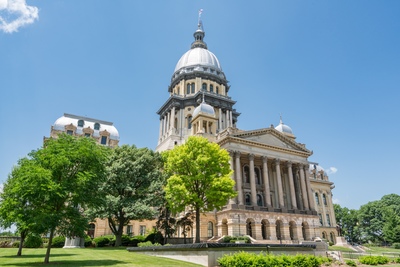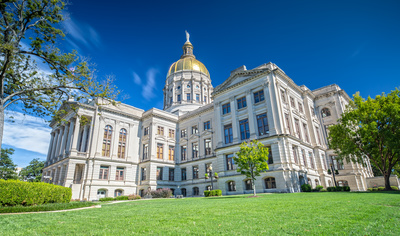
Energy & Environment
How Small Modular Reactor Laws Are Reshaping State Nuclear Energy Policy
January 23, 2026 | David Shonerd
October 31, 2023 | Denys Emmert

Key Takeaways:
This article is part of our latest series: Major Issue Trends in 2023: State Legislative Recap. In this series, our experts examine the high-level legislative trends they saw in the 2023 state sessions. In addition to discussing the most prevalent issues considered by state policymakers, they explore some of the more surprising emerging trends we noticed, plus what to expect in 2024 for many of these policy areas. The series will be released during November and December, with new articles each week. Explore the full series here, and be sure to sign up for our email list so you don’t miss out on any articles (check the “Blog Posts” box).
Electric vehicles (EVs) were a prominent issue in 2023 as legislators in 47 states introduced over 500 bills related to EVs. Twenty-six states enacted legislation related to EVs alone, with Texas, Utah, Colorado, and New York leading the way with the highest volume of enacted bills.
There were two main themes with the EV legislation considered this year. First, we saw increased activity related to incentives for EV purchases, such as rebates, tax credits, and the ability to use HOV lanes. Second, we saw legislation related to building EV infrastructure, such as state-run charging stations and incentives for homeowners and businesses to install chargers (e.g. MD HB 550).
State lawmakers also enacted legislation to create new fees on electric vehicles in an attempt to recover lost gas tax revenue to pay for roads. For example, some bills would replace vehicle registration fees with a capped mileage-based user fee, impose higher or new registration fees on EVs, tax the kilowatt-hour on electricity used to charge at public charging stations, or charge an additional registration fee based on the weight of the vehicle.
Legislation on EVs has been a bipartisan affair, however, there are some major differences in the political trends. Typically, Republican-controlled states have focused on raising revenues to ensure that gas-tax-skipping EV drivers are paying their share of road construction and maintenance costs. Democratic-controlled states have focused on providing benefits to EV buyers, such as allowing EVs in HOV lanes, and mandating changes in building codes to require EV charging hookups in new construction, along with the typical incentives to purchase an EV, especially for low-income households.
Legislation addressing EVs will continue to be prevalent in 2024. Here are some of the types of legislation we expect to see going forward:
Subsidies and incentives for people and businesses to buy EVs, specifically by creating credits for companies to transition fleets to EVs, credits for buying used EVs, and making installing and operating EV charging infrastructure easier.
Taxes and fees on EVs as a way to recover lost revenue of gasoline and other taxes from gasoline vehicles.
Incentives to encourage the building of EV charging stations (especially with the recent announcement of the compact between several auto manufacturers to build an EV charging network).
Requirements for public-use EV charging stations to be equipped with a standard EV charging connector or plug, similar to Texas SB 1732.
Creation of specific funding or training on how to deal with EV fires,(e.g., AL SB 87) or to prevent the potential collapse of parking garages resulting from the higher weight of EVs compared to conventional gasoline-powered vehicles.
Finally, we may see states pursue preemption of local EV laws. Examples include Arkansas HB 1572, which prohibits local governments from requiring a fuel retailer to invest in a particular kind of fueling infrastructure, and Colorado HB1233, which limits the ability of state electrical boards to prohibit the installation of EV charging stations.
MultiState’s team is actively identifying and tracking legislation related to electric vehicles so that businesses and organizations have the information they need to navigate and effectively engage with emerging laws and regulations. If your organization would like to further track EVs or other related energy issues, please contact us.

January 23, 2026 | David Shonerd

January 22, 2026 | Daniel Kampf

October 27, 2025 | Billy Culleton